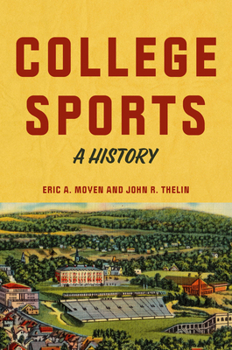College Sports: A History
A bold and foundational history of the inception and evolution of intercollegiate athletics in the United States.
In College Sports, historians Eric A. Moyen and John R. Thelin tell the intriguing story of the success--and excess--of American college sports from their inception to today. Arguing that the modern American university's structure spurred the growth of big-time sports, Moyen and Thelin also highlight the treatment of marginalized groups in athletics and the role that commercialization and the media have played in shaping college sports.
Using a wealth of secondary resources, archival records, newspaper articles, and oral histories, Moyen and Thelin offer a chronological account of the popularity, success, and continued challenges of college sports. Most scholarship has portrayed athletics as an anomaly within higher education, but history reveals that college sports enjoy a symbiotic relationship with universities. Reform and a return to a purely amateur model have rarely been a compelling option for those institutions that are successful in commercialized big-time college sports. At the same time, the majority of student-athletes compete in a very different model. And despite their progressive posturing, colleges have been slow to fully adopt civil rights and social justice issues. When full participation was finally extended to women and minorities, it generally meant a move away from the amateur model into a commercial enterprise.
By examining key events at specific universities, athletic conferences, and the NCAA, Moyen and Thelin trace how the media and sports marketing have created an incredibly successful financial model for schools in big-time conferences. Yet this model has also created a precarious fiscal situation for hundreds of other institutions. This provocative and refreshing take on sports in American universities provides the context in which to understand--and improve upon--the current landscape of intercollegiate athletics.





